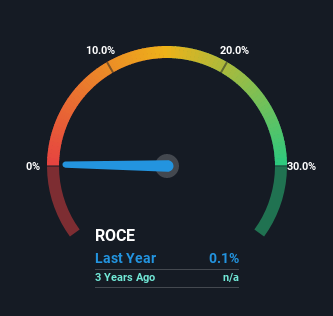- Italy
- /
- Commercial Services
- /
- BIT:ISC
We Like These Underlying Return On Capital Trends At Integrated System Credit Consulting Fintech (BIT:ISC)
What are the early trends we should look for to identify a stock that could multiply in value over the long term? Amongst other things, we'll want to see two things; firstly, a growing return on capital employed (ROCE) and secondly, an expansion in the company's amount of capital employed. Put simply, these types of businesses are compounding machines, meaning they are continually reinvesting their earnings at ever-higher rates of return. With that in mind, we've noticed some promising trends at Integrated System Credit Consulting Fintech (BIT:ISC) so let's look a bit deeper.
What Is Return On Capital Employed (ROCE)?
Just to clarify if you're unsure, ROCE is a metric for evaluating how much pre-tax income (in percentage terms) a company earns on the capital invested in its business. The formula for this calculation on Integrated System Credit Consulting Fintech is:
Return on Capital Employed = Earnings Before Interest and Tax (EBIT) ÷ (Total Assets - Current Liabilities)
0.0013 = €25k ÷ (€20m - €580k) (Based on the trailing twelve months to December 2022).
Thus, Integrated System Credit Consulting Fintech has an ROCE of 0.1%. Ultimately, that's a low return and it under-performs the Commercial Services industry average of 14%.
See our latest analysis for Integrated System Credit Consulting Fintech

While the past is not representative of the future, it can be helpful to know how a company has performed historically, which is why we have this chart above. If you'd like to look at how Integrated System Credit Consulting Fintech has performed in the past in other metrics, you can view this free graph of past earnings, revenue and cash flow.
So How Is Integrated System Credit Consulting Fintech's ROCE Trending?
We're delighted to see that Integrated System Credit Consulting Fintech is reaping rewards from its investments and is now generating some pre-tax profits. Shareholders would no doubt be pleased with this because the business was loss-making two years ago but is is now generating 0.1% on its capital. Not only that, but the company is utilizing 1,283% more capital than before, but that's to be expected from a company trying to break into profitability. This can indicate that there's plenty of opportunities to invest capital internally and at ever higher rates, both common traits of a multi-bagger.
The Key Takeaway
To the delight of most shareholders, Integrated System Credit Consulting Fintech has now broken into profitability. And since the stock has fallen 15% over the last year, there might be an opportunity here. So researching this company further and determining whether or not these trends will continue seems justified.
One final note, you should learn about the 3 warning signs we've spotted with Integrated System Credit Consulting Fintech (including 1 which is a bit unpleasant) .
For those who like to invest in solid companies, check out this free list of companies with solid balance sheets and high returns on equity.
New: AI Stock Screener & Alerts
Our new AI Stock Screener scans the market every day to uncover opportunities.
• Dividend Powerhouses (3%+ Yield)
• Undervalued Small Caps with Insider Buying
• High growth Tech and AI Companies
Or build your own from over 50 metrics.
Have feedback on this article? Concerned about the content? Get in touch with us directly. Alternatively, email editorial-team (at) simplywallst.com.
This article by Simply Wall St is general in nature. We provide commentary based on historical data and analyst forecasts only using an unbiased methodology and our articles are not intended to be financial advice. It does not constitute a recommendation to buy or sell any stock, and does not take account of your objectives, or your financial situation. We aim to bring you long-term focused analysis driven by fundamental data. Note that our analysis may not factor in the latest price-sensitive company announcements or qualitative material. Simply Wall St has no position in any stocks mentioned.
About BIT:ISC
Integrated System Credit Consulting Fintech
Integrated System Credit Consulting Fintech S.p.A.
Reasonable growth potential with mediocre balance sheet.
Market Insights
Weekly Picks


Crazy Undervalued 42 Baggers Silver Play (Active & Running Mine)


Fiducian: Compliance Clouds or Value Opportunity?

Willamette Valley Vineyards (WVVI): Not-So-Great Value
Recently Updated Narratives

Significantly undervalued gold explorer in Timmins, finally getting traction

Moderation and Stabilisation: HOLD: Fair Price based on a 4-year Cycle is $12.08


Positioned globally, partnered locally
Popular Narratives


MicroVision will explode future revenue by 380.37% with a vision towards success


NVDA: Expanding AI Demand Will Drive Major Data Center Investments Through 2026


GOOGL: AI Platform Expansion And Cloud Demand Will Support Durable Performance Amid Competitive Pressures
Trending Discussion




